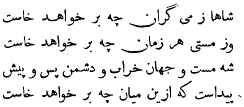No CrossRef data available.
Published online by Cambridge University Press: 24 December 2009
Had Ihn al-Ṭiqṭaqā direct access to the Ta'rīkh-i-Jahān-Gushāy ? He twice quotes it by name and there are two other passages for which it must have been his source; but the question is whether he made use of Juvaynī's work at first hand. That he knew Persian is evident from his twice quoting Persian verses. Of these the following are also in Juvaynī:

“O king, what will come of (drinking) strong wine ?
And what will come of continual drunkenness ?
The king drunk, the world in rums and enemies before and behind— It is plain to see what will come of this! ”
These verses were, according to Ibn al-Ṭiqṭaqā, addressed to Jalāl al-Dīn Khwārazmshāh by his court poet, whereas all that Juvaynī says is that they were composed by some unspecified person à propos of Jalāl al-Dīn's conduct. But the discrepancy is not an important one, and it seems not unreasonable to suppose that Ibn al-Ṭiqṭaqā copied these verses from Juvaynī and that, in consequence, he examined the latter's work in the original.
page 175 note 1 Kitāb al-Fakhrī, Cairo ed. (a.h. 1317), p. 19Google Scholar, where the account of Wang Khan is a résumé of Juvaynī's chapter on the rise of Khan, Chingiz (I, 25–29), and p. 20Google Scholar where reference is made to the tales recounted about the generosity of Ögedey, his son and successor, tales which had been collected together by Juvaynī in a long chapter (I, 158–191).
page 175 note 2 op. cit. pp. 40 (the verses quoted in the text) and 291.
page 175 note 3 II, 187.
page 175 note 4 These lines have been curiously misunderstood by the translators of al-Fakhrī. See Amar, (p. 74)Google Scholar and Whitting, (p. 41).Google Scholar
page 175 note 5 op. cit., p. 48.
page 176 note 1 I, 19, 23–24.
page 176 note 2 I, 20, 12–15.
page 176 note 3 op. cit., p. 97.
page 176 note 4 I, 24, 16–19.
page 177 note 1 “Of the laws which Chingiz Khan framed and the yasas which he promulgated after his rise to power.” (I, 16–25).Google Scholar
page 177 note 2 In the Masālik al-Abṣār fī Mamālik al-Amṣār of Shihāb al-Dīn Aḥmad b. Yahyā b. Faḍ-lallāh al-Kātib al-Dimishqī. See Qazvīnī', Muḥammads introduction to the Ta'rīkh-i-Jahān-Gueshāy, p. lxxx. (Enghsh translation, p. lxi.)Google Scholar